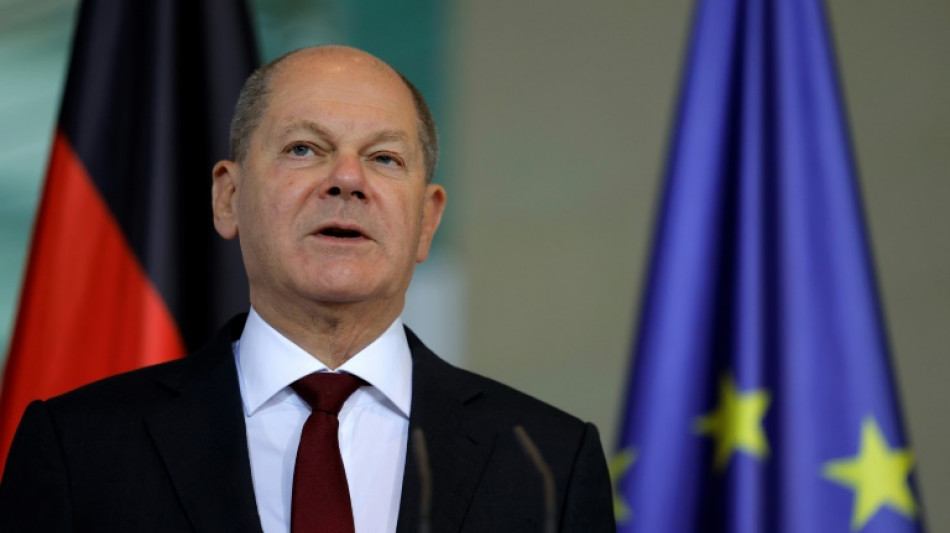
| RIO | -0.41% | 59.01 | $ | |
| SCS | 0.58% | 11.97 | $ | |
| CMSC | -0.85% | 23.46 | $ | |
| BTI | -0.33% | 36.31 | $ | |
| NGG | 0.66% | 59.31 | $ | |
| BCE | -0.93% | 22.66 | $ | |
| CMSD | -0.67% | 23.32 | $ | |
| RBGPF | -1.17% | 59.8 | $ | |
| GSK | -0.12% | 34.08 | $ | |
| BP | 0.38% | 28.96 | $ | |
| RYCEF | 0.14% | 7.26 | $ | |
| BCC | -1.91% | 120.63 | $ | |
| RELX | -0.61% | 45.58 | $ | |
| AZN | -0.39% | 66.26 | $ | |
| VOD | 0.12% | 8.43 | $ | |
| JRI | -0.41% | 12.15 | $ |
German govt loses key case on debt rules at top court

Germany's top court ruled Wednesday against the government in a case centred on whether it had broken debt rules, wiping 60 billion euros from a key climate fund and further testing the unity of the ruling coalition.
The Federal Constitutional Court had been examining accusations from the main opposition CDU party that Chancellor Olaf Scholz's ruling coalition has acted in contravention of the "debt brake".
This key commitment to balanced budgets caps Germany's new borrowing to 0.35 percent of gross domestic product.
The brake was suspended from 2020-2022 to deal with shocks from the coronavirus pandemic and energy crisis, as is permitted during emergencies, but came back into force this year.
The court case centred on a change to accounting rules for funds outside the main budget that was implemented last year by the centre-left-led coalition, giving it more room for deficit spending outside times of crisis.
In particular, it looked at a decision to transfer 60 billion euros ($65 billion) of loan authorisations that had been part of pandemic support programmes to a fund aimed mainly at fighting climate change.
The court in Karlsruhe, southwest Germany, found this move was "incompatible" with the constitution and overturned it, ruling in favour of a legal complaint lodged by the CDU.
"The court's decision means that the volume of the 'climate and transformation fund' is reduced by 60 billion euros," it said in a statement.
If the state "has entered into obligations that it can no longer service as a result of this reduction," it must be compensated for "through other means".
The court underlined that the "de facto unlimited use of emergency borrowing authorisations in subsequent fiscal years" without accounting for them in those years and instead counting them in the previous fiscal year is "impermissible".
The ruling, which essentially outlaws the rolling over of funds for other uses, could have implications for other "off-budget funds" set up by the government, analysts have said.
The decision is also likely to further strain ties within Scholz's three-party coalition, particularly with the pro-market FDP, which pushed to ensure the debt brake was reinstated and is seeking to rein in spending.
- Debt debate -
The climate fund -- worth 212 billion euros before the ruling -- is aimed in large part at speeding up Germany's shift to an emissions-free economy, with measures such as helping cover the cost of replacing gas boilers with more climate-friendly heat pumps.
The coalition argued the fund was not part of the main budget, and thus not relevant in calculating whether the debt brake was being respected.
But law professor Hanno Kube, who advised the plaintiffs, told AFP that "the purpose of the fund is not an emergency situation... but a long-term challenge, the fight against climate change".
In court hearings in June, the government argued the climate fund also addressed long-running consequences of the pandemic.
But Kube dismissed this, saying the green transition was not "at all linked to overcoming the economic crisis linked to the coronavirus".
The court's ruling, which comes after nearly five months of deliberations, will likely further fuel ongoing debates around whether the debt brake needs to be relaxed.
While the FDP has pushed for it to be kept in place, Economy Minister Robert Habeck of the Green party called last month for the rules to be redesigned for times of crisis.
A strict spending limit had been designed in an era of benign "globalisation, friendly coexistence and cheap Russian gas", which had now come to an end, Habeck said.
F. Schulze--BTZ

 London
London

 Manchester
Manchester
 Glasgow
Glasgow
 Dublin
Dublin
 Belfast
Belfast
 Washington
Washington
 Denver
Denver
 Atlanta
Atlanta
 Dallas
Dallas
 Houston Texas
Houston Texas
 New Orleans
New Orleans
 El Paso
El Paso
 Phoenix
Phoenix
 Los Angeles
Los Angeles



